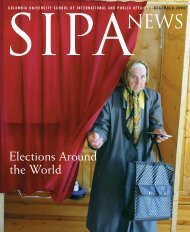Promoting IDPs' and Women's Voices in Post-Conflict Georgia
Promoting IDPs' and Women's Voices in Post-Conflict Georgia
Promoting IDPs' and Women's Voices in Post-Conflict Georgia
- No tags were found...
You also want an ePaper? Increase the reach of your titles
YUMPU automatically turns print PDFs into web optimized ePapers that Google loves.
society would be much weaker without <strong>in</strong>ternational support. 384 It is also <strong>in</strong>terest<strong>in</strong>g to note that donorshave much more say over where the funds are used than <strong>in</strong> the past.Some NGO leaders express concern over this <strong>in</strong>creased control over the disbursement of <strong>in</strong>ternationalfunds, argu<strong>in</strong>g that it prevents IDPs from be<strong>in</strong>g able to choose among the durable solutions or <strong>in</strong>fluencepolicy priorities regard<strong>in</strong>g them. Rather, the “choice comes from the money <strong>and</strong> donorconditionality.” 385 Moreover, they argue that the MRA wants to <strong>in</strong>clude IDPs <strong>and</strong> implement betterprograms, but cannot secure the fund<strong>in</strong>g. The money received from donors is earmarked for certa<strong>in</strong>purposes, preclud<strong>in</strong>g it from be<strong>in</strong>g used for <strong>in</strong>itiatives not aligned with donor <strong>in</strong>terests.Gender Focus of International ProgramsInternational donors <strong>and</strong> NGOs also promote the <strong>in</strong>creased participation of women IDPs <strong>in</strong> politics, <strong>and</strong>gender equality more generally, through the programs they fund <strong>and</strong> implement. Their particularsupport for projects on women’s issues <strong>in</strong>fluences the high level of IDP women’s <strong>in</strong>volvement <strong>in</strong> theNGO sector compared to their male counterparts. Accord<strong>in</strong>g to a former government official <strong>and</strong> NGOrepresentative, <strong>in</strong> pr<strong>in</strong>ciple this is a positive trend, but the “level of general <strong>in</strong>formation <strong>and</strong>underst<strong>and</strong><strong>in</strong>g of women’s issues is really still low, even at level of the NGOs.” 386 NGOs primarily haveexperience with psychosocial rehabilitation, <strong>and</strong> women’s issues <strong>in</strong> displacement sett<strong>in</strong>gs oraccommodation, <strong>and</strong> not with women’s rights more generally <strong>in</strong> the country. In many cases, womenface similar barriers whether they are displaced or not, <strong>and</strong> underst<strong>and</strong><strong>in</strong>g the ‘big picture’ can help <strong>in</strong>coord<strong>in</strong>at<strong>in</strong>g efforts <strong>and</strong> build<strong>in</strong>g a strong movement for IDPs’ <strong>and</strong> women’s representation.Furthermore, this lack of underst<strong>and</strong><strong>in</strong>g of women’s issues more generally reflects an important barrierfor <strong>in</strong>creased women’s political participation. That is, despite recent legislative ga<strong>in</strong>s <strong>in</strong> the area ofwomen’s rights, efforts to exp<strong>and</strong> gender equality are often viewed as unnecessary, believed to beimposed by <strong>in</strong>ternational donors <strong>and</strong> weaken traditional ways of life. 387In contrast to push<strong>in</strong>g a gender equality agenda, some donors may fund programs that lack any genderfocus at all, which has negative implications for support<strong>in</strong>g this broad goal. Accord<strong>in</strong>g to an NGO leader,“there are some problematic assumptions with<strong>in</strong> the <strong>in</strong>ternational development sphere – developmentfails to realize that there are equal numbers of men <strong>and</strong> women <strong>and</strong> children (with<strong>in</strong> <strong>in</strong>ternationaldevelopment) - practitioners can be more successful if they realize this po<strong>in</strong>t.” 388 This exemplifies ageneral trend <strong>in</strong> development programm<strong>in</strong>g that tends to <strong>in</strong>corporate the needs of men, assum<strong>in</strong>g theyare the same for women.384 L<strong>in</strong>coln Mitchell (Associate Professor, Harriman Institute, Columbia University), Personal Interview, 9 December 2011 <strong>and</strong>Rusudan Kervalishvili, Personal Interview.385 IDP Woman Leader. Personal Interview. March. 2012.386 Tamar Tchelidze, Personal Interview.387 Asatoorian et al. “Gender Ma<strong>in</strong>stream<strong>in</strong>g <strong>in</strong> Education <strong>in</strong> <strong>Georgia</strong>: Analysis <strong>and</strong> Recommendations,” Columbia University.2010, 5.388 Kharavashvili, Julia. Personal Interview. January. 2012.74

















